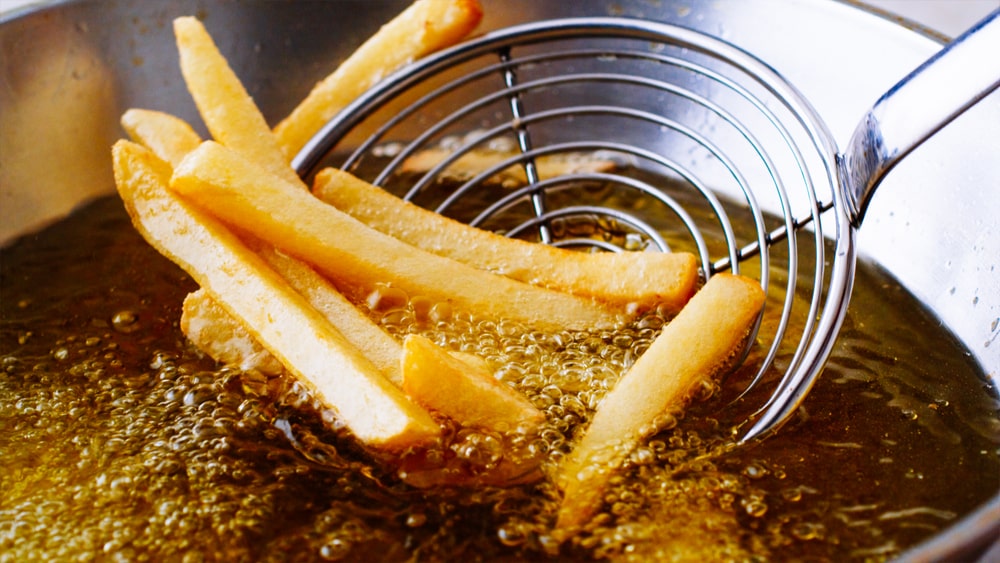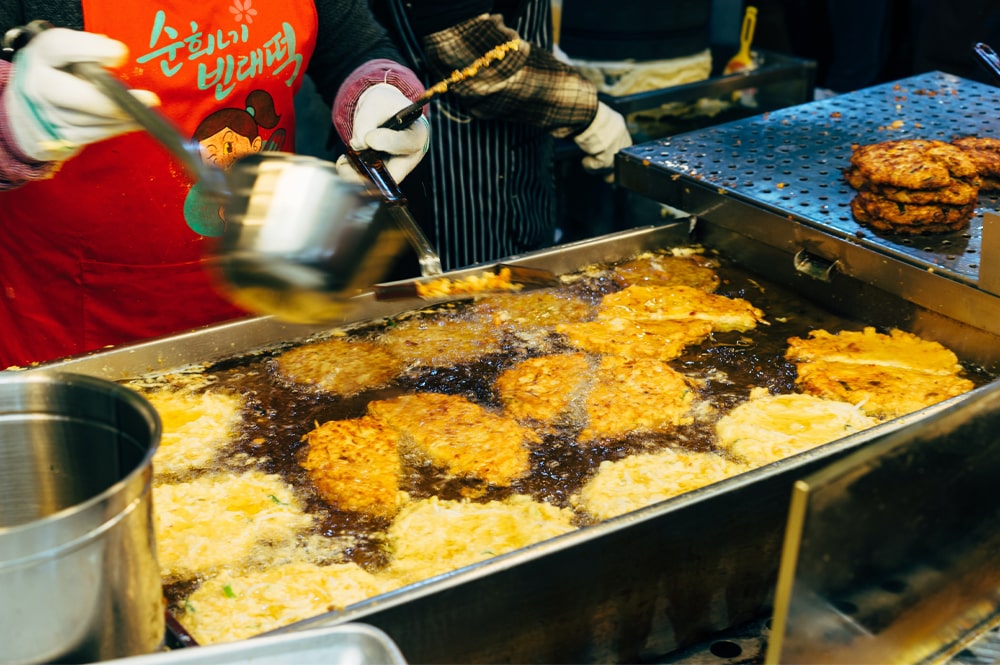Your Cart is Empty
Free US Shipping
Free US Shipping
Cooking with oil can make some of the most delicious meals, but it can be expensive when you start deep frying or using oil regularly. You don’t realize how quickly and easily your oil cost goes up. So can cooking oil be reused?
Simply put, the answer is yes. You can reuse cooking oil as long as you store and reuse it safely. There are many things you should consider when you reuse oil and how you should reuse it. You don’t want to do it the wrong way that will cause health risks.
Everything you need to know about reusing oil, the best oils to reuse, and when you should get rid of it, you can find it here. Continue reading to become well-versed in the art of reusing your cooking oil.
Yes! Reusing oil is a great way to reduce your expenses while being environmentally friendly by reducing your waste. There are many safe methods to reusing your cooking oil that don’t take too much extra time out of your day.
There are many things you need to consider when you reuse your oil, like is it clean enough, what did you use it for, how old it is, and so much more, but with the proper method, you can do this safely. And as you continue to do this, you will be doing this with so much ease!
Yes, it is safe as long as you follow the proper reusing. You will look out for many things that make your cooking oil reusable. You just need to keep these in mind and ensure that you store the oil correctly.
So how do you reuse cooking oil without it being a danger to you? It is a pretty simple process. Follow these steps to ensure you are reusing the cooking oil safely:
Choose your oil wisely. Each type of oil needs to be heated at different temperatures and better for different frying methods or foods. If an oil has a specific temperature and you aren’t well-versed in oils, you may want to stick with an easier oil to use.

If you are looking for oils that won’t easily break down, there are quite a few that are easy to use and less expensive than other oils:
These oils have a high smoking point, making them harder to break down. They are great to reuse, especially for beginners. Try to stay away from expensive oils like olive oil. They have different smoking points and tend to go bad more quickly.
When the goal is to reuse the oil, you need to fry correctly to reuse it. Many frying methods can ruin the oil, and then you won’t reuse it. You will have just to throw it out because the oil broke down or became unstable. Follow the recommended cooking temperature for your oil because cooking at too high or low a temperature may
Cooking the oil at too high a temperature, significant smoking of the oil or cooking food with too much moisture can all damage the oil and make it unstable.
You will know that the oil has become unstable when your food becomes greasy, greasier than usual. The frying method wasn't correct if the oil looks nasty while you cook it, and the oil has been ruined.
At any point when you fry your food, there may be remnants in the oil. It happens and this is nothing out of the ordinary, but you don’t want these pieces of food or even fats to stay in the oil when you want to reuse it. This can change the taste of your oil and end up ruining your future meals.

Once the oil has cooled, you can sift out all the leftover food particles. You can use cheesecloth in a metal strainer to get all the leftover crumbs out. Then put it in your storage container.
There are many different types of oils that you can reuse, but each has its own flavor and frying point. You want to ensure you are storing your oil separately so that the frying is consistent. It can also be a safety measure if someone is allergic to peanuts and you mix peanut oil in with everything.
You also want to consider what you originally used the oil for. If you deep-fried some fish, it may have a fishy flavor that you don’t want to be added to your french fries. It is important to add this if you used the oil to cook a potent food that could taint future meals.
Always, always, always, label your oil when you are reusing it. This is not only important for others who may want to use it but also for you so that you know what is in each container. You don’t want to mix up your oils, foods, or other items or use outdated oil.
It is important to add all of these to your label to ensure the safest use of the cooking oil:
When you are storing your oil, there are a few recommendations. All you need to do is ensure that you store it in a sealable container so the oil doesn’t get contaminated or spills on anything. Then you chose a cool, dry place to store it like a refrigerator.
You don’t want to store the oil anywhere that is room temperature. Yes, this is okay with unused oil but with reused oil, you have introduced food to it. The fridge will slow down any bacteria growth so that you can use it later on.
Once you have completed all these steps, you can now reuse your oil. You will cook it like you would if it were fresh oil. You don’t have to change anything like the temperature or how you fry things just because it is used oil.
There really isn’t a set number of times you can use the oil. You will just want to go by how the oil looks. If you use the oil and your food becomes extra greasy or the color is odd and dark, you may want to retire the oil.
If it looks nasty or cloudy, then it will need to be thrown away. Remember, that if it looks or smells nasty, then chances are the oil is ready to be retired. Some oils you can use ten times without the oil going bad and other times, it may be just a few times.
To make your oil last as long as possible, ensure that you are clean and filter the oil between uses. You also need to cook the oil at the right temperatures, so the oil doesn’t break down and go bad quicker.
Unlike the number of times, you can reuse your oil, there is an expiration date on how long you can reuse the oil. Even if the oil still looks good, you don’t want to use the oil for more than two months.
Yes, you are cooking at high temperatures, so normally, any bacteria or mold cannot live in these conditions, but there are still chances of contamination. You don’t want to risk the oil being bad even though it may still look good.
There are many times when you shouldn’t reuse the oil. You don’t need any special tools to know that your oil has gone bad. You can just use your observations and the way your food looks to know if the oil needs to be disposed of or not. Here are some things to look out for:

If you see any of these things in your oil, just dispose of it. Bacteria and other free radicals can damage the oil as well as make it unsafe to cook with. If you are unsure, then trust your gut and just throw it away. Using new oil is better than getting food poisoning.
There are many things you can do that will make your last longer but there are things that you could do that will ruin your oil. Here are a few mistakes that will ruin your oil:
There are many ways that you can make your oil last longer. These methods will help you so that you can get the most out of reusing your oil. Here are some easy things you can do:
The batter you use can make your oil’s life shorten or lengthen it. Use simple batters that won’t break off into your oil. You don’t want to have a lot of excess food particles that could make your oil go bad quickly.

If you can, try frying your food without any batter. Many vegetables are great fried without frying them with a lot of batter and seasonings. This will reduce the number of particles within your oil and make it easier for you to clean it to reuse it.
Never skip this step when you are reusing your oil. Always filter your oil and use a cheesecloth for the best results. You want to do your best to remove all food particles so that it doesn’t contaminate the flavor of your next frying use.
If you don’t filter between uses, you will find that the oil will go bad quickly and you could find yourself getting food poisoning. When there is more food in the oil, there are more chances for bacteria growth, even when the refrigerator slows the rate of bacteria growth.
Fatty meats can be quite yummy when you fry them in a pan, but if your goal is to reuse the oil then try not using that oil with fatty meats. Fatty meats can add a lot of juice and fat to the oil which can disrupt the quality of the oil.
Always check the smoking point of the oils you are reusing. Some have a lower smoking point than others and may break down after a certain point. Many people will skip this step completely and this is the easiest mistake that you could make. Just check to see what the smoking point is so that you have the longest-lasting oil.
Cooking oil is one ingredient that you can reuse for long periods with the proper storage and cleaning. Many restaurants and experienced cooks will tell you that they reuse oil all the time. Just practice these safe methods and know when to dispose of your oil for the best results.
